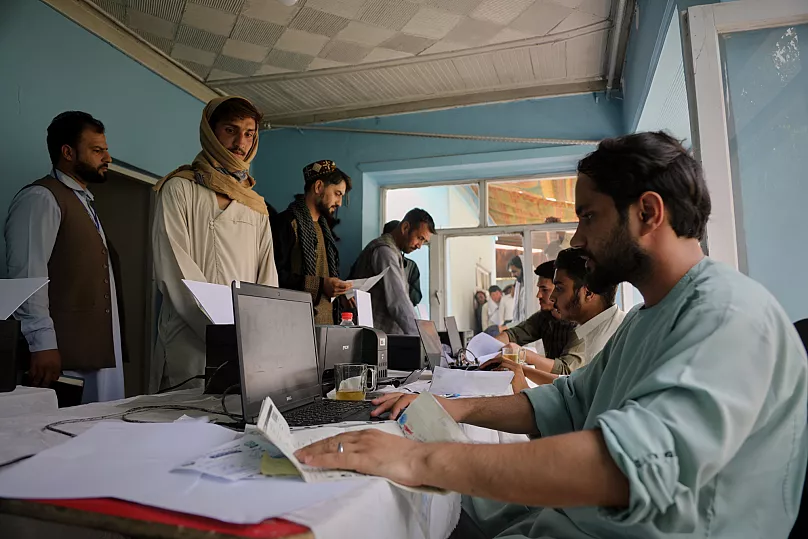Taliban registers Afghan refugees for jobs in Qatar in a major initiative aimed at addressing the severe unemployment crisis facing Afghanistan. On August 13, 2025, the Taliban Ministry of Labor and Social Affairs officially registered 1,800 unemployed Afghan refugees for employment opportunities in Qatar. This program specifically targets Afghans who were forced to return from neighboring countries like Iran and Pakistan and are now struggling to find work in their homeland.
The initiative has been described by government officials as a way to alleviate domestic joblessness, provide stable income for Afghan families, and strengthen Afghanistan’s diplomatic and economic ties with Gulf countries.
Background: Afghanistan’s Mounting Unemployment Crisis
Afghanistan has been grappling with an escalating unemployment problem for years, worsened by political instability, economic stagnation, and the mass return of refugees. Over the past decade, millions of Afghans sought employment in neighboring countries such as Iran and Pakistan. However, political and economic tensions in these host countries led to the forced expulsion of many Afghan workers.
In 2025 alone, it is estimated that over two million Afghan nationals returned to Afghanistan under challenging circumstances. Many of these returnees faced limited resources, no access to education or professional training, and few job opportunities. The Taliban’s labor registration program for Qatar is designed to address these challenges and provide a lifeline to displaced workers.
Registration Process and Job Categories
The registration process spanned four major Afghan cities: Kabul, Kandahar, Herat, and Nangarhar. Afghan refugees holding valid refugee certificates were eligible to participate.
According to Labor Ministry spokesman Samiullah Ibrahimi, the 1,800 job positions cover 22 different categories, ranging from construction and hospitality to technical and skilled trades. The government emphasizes that these jobs were selected based on Qatar’s labor market demands to ensure that Afghan workers can be effectively absorbed and successfully employed abroad.
This is not the first initiative of its kind. A previous registration in July 2025 registered 3,100 Afghan refugees for similar opportunities in Qatar. The continued partnership between Afghanistan and Qatar reflects a growing diplomatic and economic collaboration.
Economic and Social Implications
The Taliban’s registration program for Afghan refugees in Qatar is a strategic attempt to reduce domestic unemployment while boosting Afghanistan’s economy through remittances. Afghan workers employed abroad can send money home, helping families survive and stimulating local markets.
Experts believe that labor export programs can play a critical role in mitigating economic hardship, particularly in countries with high unemployment rates and limited domestic job creation. The Qatari jobs also provide Afghans with professional experience, potentially improving their long-term employability and skills development.
Beyond economic benefits, the initiative carries social and diplomatic significance. It helps reinforce Afghanistan-Qatar relations, while signaling Afghanistan’s willingness to engage constructively with international partners to solve domestic challenges.

Human Stories: Hope and Opportunity
For many Afghan families, this initiative represents more than just a job—it’s hope. Fatima, a 28-year-old returnee from Iran, expressed relief after learning about the registration. “We have been struggling to survive since returning,” she said. “This opportunity gives my family a chance to have a stable income and a better future.”
Similarly, Ahmad, a 35-year-old skilled construction worker from Nangarhar, emphasized the importance of dignity in employment. “Being able to work abroad and send money home is not only financial support; it restores our sense of purpose and pride,” he noted.
Challenges and Criticisms
Despite its potential, the program faces challenges. Some Afghan returnees reported difficulty accessing registration centers due to transportation and bureaucratic barriers. Others raised concerns about the transparency and fairness of the selection process.
Additionally, critics argue that reliance on labor migration is a short-term solution. Afghanistan still requires substantial domestic economic reforms, job creation, and infrastructure development to ensure sustainable employment opportunities at home.
Looking Ahead: Expanding Opportunities
The Taliban government has indicated plans to negotiate similar labor agreements with other countries, including Saudi Arabia, the United Arab Emirates, Oman, Turkey, and Russia. These agreements aim to provide more jobs for Afghan workers and reduce domestic economic pressures.
Analysts believe that with proper planning, support systems, and transparency, labor export programs like this one could provide a meaningful path for Afghan refugees and returnees to rebuild their lives, improve their skills, and contribute to both the Afghan and global economy.
Conclusion
The Taliban’s registration of 1,800 Afghan refugees for jobs in Qatar is a landmark initiative addressing the dual challenges of unemployment and economic instability. While challenges remain in terms of implementation and long-term sustainability, the program offers hope for Afghan families struggling to survive amid political and economic uncertainty.
By providing job opportunities abroad, fostering international partnerships, and supporting the livelihoods of its citizens, the Taliban is taking a significant step toward addressing one of Afghanistan’s most pressing social and economic issues.
Do follow us: Instagram
Read More: Fast Food & Quick Service Market Sees 7 Powerful Growth Trends



